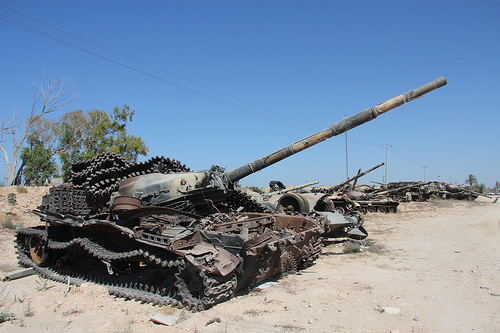
The tragic events unfolding in North Africa have brought to the attention of the West a reality that has been long underestimated and neglected: the rapid collapse of law and order in the countries that went through the revolts of the so-called Arab spring. Western countries have relied on the hope that new governments across the region could maintain stability and peace largely on their own, and therefore neglected to support these governments in their struggles. This is clearly not a strategy that has succeeded, and the United States will be forced to make hard choices in the next few weeks regarding the security situation in the Maghreb and Sahelian regions of North Africa. The American strategy of “leading from behind” that seemed, at first, a successful one in the Libyan intervention and the overthrow of Moammar Gadhafi has been thrown into question by the unfolding of the events in Mali, Algeria, and Egypt.
Intervention in Libya unfolded in the following way: the French, British, and Qataris provided direct assistance and were provided with technical support by the United States, ultimately defeating the forces of Colonel Gadhafi and handing over control of the territory to a new Libyan government. This was supposed to unify the various militias that had conducted the revolution and establish the rule of law of a new free Libya. NATO troops and support terminated their operations with the killing of Gadhafi withdrew from the operative theater, abandoning the Libyan government to its destiny.
Since the NATO withdrawal, the security situation in Libya has deteriorated dramatically, reaching a state that is dangerous not only for Libya but for the entire region; the central government exerts little control over the southern reaches of the country while criminals smuggling drugs, weapons, and human beings have practically a free way throughout the whole region.
Terrorists of various jihadist organizations have also exploited this power vacuum to establish training camps in the eastern and southern parts of the country. From these bases, attacks are conducted against domestic and foreign institutions in Libya and its neighboring countries.
Tunisian security forces have intervened more than once to stop terrorist infiltrations and the trading of weapons across the border. Egyptian security forces have done the same, including the arrest of Libyan terrorists in Cairo after discovering a cache of weapons destined for bandits in the Sinai; Israeli sources confirmed that Libyan weapons have been found in the hands of terrorists conducting attacks against the state of Israel from the Peninsula.
The destabilization of Mali in recent weeks is no doubt a result of the collapse of control in the Libyan state and might easily come to involve Algeria, Niger, Chad, and the Sudan, not to mention the support that terrorist organizations in Nigeria are receiving via Niger from their cohorts in Mali and Libya.
As many analysts have pointed out, the collapse of Libyan security and the transformation of Libyan territory into a safe haven for jihadi terrorists is causing a security nightmare in the area that could easily spill over into southern Europe through the porous coastal borders of Tunisia and Libya.
It is time for the Obama administration to understand that contrary to its previous evaluation, North Africa, because of the threat to international security that its destabilization can cause, should become an area of primary interest for the United States. At this point, it is important to ask what might be done to deter and prevent such a potentially catastrophic situation. The primary cause of this collapse in security is also the place where the solution lies: Libya.
The administration must engage Libyan institutions in a more proactive way, and there must be a guarantee of physical protection for the members of the government, the assembly, and local councils. The Libyan government should be pushed to ask for NATO support in training a military force to be put at the direct command of the Libyan prime minister to guarantee the enforcement of the central government’s control. If order is reconstituted in Libya, it will prevent the permanent establishment of terrorist organizations in the country, thus inflicting a hard blow to a burgeoning al-Qaeda network in North Africa.
NATO forces should also be active in patrolling the southern borders of Libya in conjunction with the regular forces of the neighboring states. The agreements signed by Libyan Prime Minister Ali Zeidan last month with the leaders of the neighboring states would constitute a good legal framework for this collaboration.
The United States should look into the security situation in Libya with a keener eye toward institution-building. The issue of security collapse has become paramount, overshadowing any progress in other sectors as it causes the paralysis of decision-making in Tripoli, where the drafting of a constitution and other important measures have been stalled by continuous attacks on state institutions.
Time is running out for Libyan institutions to enforce the rule of law and establish order in the country. Time is also running out for the international community to undertake those initiatives that could prevent the creation of a powerful network of jihadi groups and preempt them from carrying out the kind of attacks that might haunt generations to come.
Karim Mezran is a senior fellow with the Council’s Rafik Hariri Center for the Middle East. This piece was first published on The American Prospect.
Photo credit: Flickr user joepyrek
Image: 8288579409_b45d0ed420.jpg
